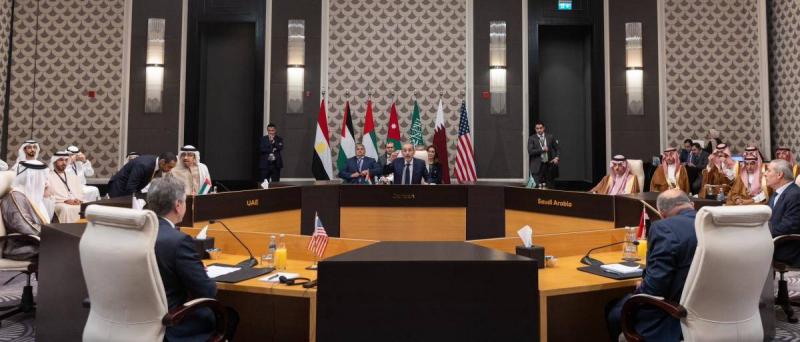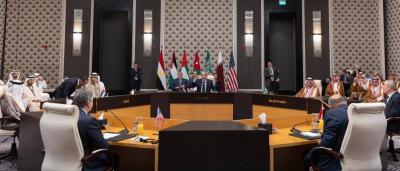Arab leaders urged U.S. Secretary of State Antony Blinken to work towards an immediate ceasefire in Gaza, hours after Palestinians reported that an Israeli airstrike killed at least 15 people at a United Nations-run school used for shelter. In a rare public disagreement, Blinken stated during a press conference alongside his Jordanian and Egyptian counterparts that a ceasefire would only allow Hamas militants to regroup. Global powers and other regional actors have been unable to reach consensus on how to address the escalating conflict that began when Hamas fighters infiltrated Israeli towns four weeks ago, resulting in 1,400 deaths and more than 240 hostages. Health officials in Gaza reported on Saturday that since then, Israel has conducted airstrikes on the territory, imposed a blockade, and launched a ground attack, provoking global concern over humanitarian conditions that have led to over 9,488 Palestinian deaths.
Blinken met with the foreign ministers of Saudi Arabia, Qatar, the UAE, Egypt, and Jordan in Amman. Jordanian Foreign Minister Ayman Safadi stated at the subsequent press conference that it is now crucial to ensure the war ends. Blinken acknowledged a shared commitment to achieving peace but recognized existing disagreements between Washington and its allies. The U.S. has limited its stance to calling for humanitarian pauses to allow aid into Gaza. Blinken remarked that “a ceasefire now would simply keep Hamas in place, allowing it to reorganize and repeat what it did on October 7.”
This visit is Blinken's second to the region since the beginning of the war between Israel and Hamas. While maintaining strong support for Israel, the U.S. has also begun calling for a temporary humanitarian ceasefire to allow aid into Gaza. Israeli Prime Minister Benjamin Netanyahu rejected a ceasefire proposal from Blinken after a day of discussions. Responding to a journalist's question about progress on a humanitarian ceasefire in Gaza, U.S. President Joe Biden said, “Yes.”
#### Bombing Targets School Yard
Hamas' armed wing reported that more than 60 hostages taken during the October 7 attacks on southern Israel are now missing due to Israeli airstrikes in Gaza, claiming that the bodies of 23 hostages are trapped under the rubble. Reuters could not immediately verify the statement. Palestinian witnesses stated that Israel targeted the Al-Fakhoura school in Jabalia, where thousands of displaced individuals reside. The Israeli military indicated that preliminary investigation results suggest its forces were not targeting the school “but the explosion may have been a result of fire directed at another target,” adding the incident is “under review.”
Video footage from Reuters showed the aftermath of the bombing, with broken furniture and belongings scattered on the ground, bloodstains, and people in tears. A boy, weeping in despair in a video obtained by Reuters, said, “I was standing here when three strikes hit, I carried one body and another whose head was severed with my own hands.” Nearby, a resident was comforting a woman in shock. One angry resident questioned, "When did shelters start getting bombed? This is really a shame."
Juliette Touma, Director of Communication and Media at the UN Agency for Palestinian Refugees (UNRWA), confirmed the bombing of the U.N.-run school located in Gaza City. Touma stated via telephone, “At least one strike targeted the yard of the school where tents for displaced families were set up.” Another strike targeted within the school where women were baking bread. The Gaza Health Ministry reported that another Israeli rocket strike resulted in the deaths of two women at the entrance of Al-Nasr Children's Hospital, with several others injured.
#### Displacement and Border Clashes
Israeli police repelled protesters demonstrating outside Netanyahu's residence amid widespread anger over failures that led to last month's attack. Coinciding with this, a poll showed that 76 percent of Israelis believe Netanyahu should resign, while 64 percent said elections should occur immediately after the war. Israeli Defense Minister Yoav Galant stated at a press conference that Israeli forces dealt a “heavy blow” to Hamas by destroying communication centers and tunnel networks over the past two days, along with killing 12 of its leaders since the war began.
Israel ordered all civilians to leave the northern part of the Gaza Strip, including Gaza City, and head south. The Israeli military announced it would allow Palestinians to use the main road in Gaza, Salah al-Din Road, for three hours on Saturday afternoon. The military posted on social media in Arabic, “If you care for yourselves and your loved ones, head south as per our instructions.” Many residents reported being extremely fearful of traversing this road. Numerous warnings were issued on social media about Israeli tanks being stationed along the road.
U.S. Special Envoy David Satterfield indicated in Amman that between 800,000 and 1 million people have already headed south in Gaza, while between 350,000 and 400,000 remain in Gaza City and its northern suburbs. Israel has imposed a comprehensive blockade on Gaza, allowing minimal aid from Egypt, citing fears of Hamas stealing the supplies. Satterfield noted that there are no recorded instances of Hamas seizing aid.
In what appears to be a precursor to an expanded ground attack, the Israeli military released footage showing armored bulldozers clearing rubble in areas of northern Gaza, describing it as “road preparation for troops.” The military stated that a joint tank and combat engineering unit conducted a “precise raid” in southern Gaza “to map existing buildings and neutralize explosives.”




